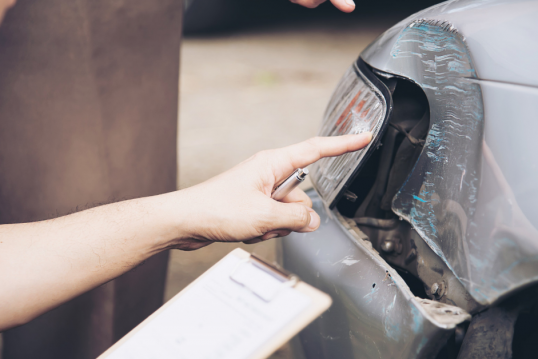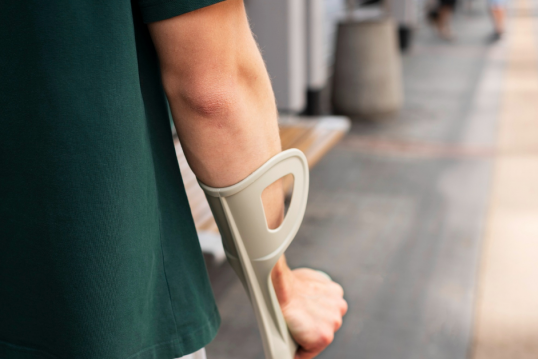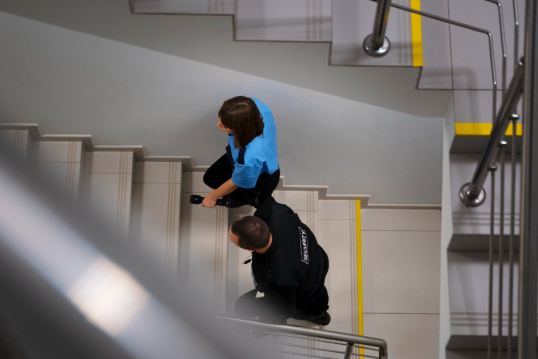Las Vegas casinos, hotels, nightclubs, and other businesses have a legal duty to provide reasonably safe conditions for guests. This includes protections against assaults and other violent crimes on these properties. When a property fails to meet this legal duty and a guest suffers harm as a result, the property may be held liable in a negligent security claim.
Victims of assaults and other third-party crimes at casinos, hotels, or nightclubs may be entitled to financial compensation if inadequate security contributed to their injuries. At the Cottle Firm, our dedicated Las Vegas personal injury lawyers help these victims seek the compensation they deserve for damages like medical bills, lost wages, pain and suffering, and emotional distress.
If you’ve recently become the victim of a violent crime at a Las Vegas hotel, casino, or nightclub, we’re here to help you understand your legal rights and take legal action. Call the Cottle Firm today at 702-722-6111 para discutir su caso en una consulta gratuita.
Property Owners’ Duty to Protect Guests and Invitees
Hotels, casinos, nightclubs, and other businesses owe certain legal obligations to their guests. In legal terms, these guests are known as invitees, and property owners owe them the highest duty of care under Ley de responsabilidad civil de Nevada. That duty includes not only keeping the property in a safe condition but also taking reasonable steps to protect invitees from foreseeable criminal acts, such as robberies or assaults.
Businesses must consider the risks that naturally come with their operations. A large casino with a 24-hour bar and heavy foot traffic has a higher likelihood of fights or theft than a small office building. A hotel parking garage or nightclub entrance may be more vulnerable to assaults, especially during late hours.
Property owners have a legal duty to evaluate these risks and implement appropriate security measures to minimize them, such as trained guards, security cameras, and good lighting. The law doesn’t expect businesses to guarantee every guest’s safety or prevent every crime, but it does require them to act reasonably based on what they know or should know about potential dangers.
When a business fails to do so, and a guest is harmed as a result, the property owner may be found negligent. For example, if a hotel knows about repeated attacks in its parking lot but does nothing to improve security, that inaction may be considered a breach of their duty of care, and anyone injured as a result may have grounds for a personal injury claim against the property.
The Role of “Notice” and Foreseeability
The question of foreseeability is at the heart of negligent security claims. According to NRS 651.015, hotels can be held liable if the wrongful act that caused the injury was foreseeable. Could the property owner reasonably have anticipated that a crime might occur? If the answer is yes, and the owner failed to take proper precautions, they may be held liable for resulting injuries.
To establish foreseeability, courts often look at whether the property owner had notice of prior criminal activity. Notice can be “actual” – meaning the owner knew about previous assaults, thefts, or disturbances – or “constructive”, meaning they should have known because the danger was obvious or ongoing. For example, if police reports show multiple muggings in a casino’s parking lot, the property owner has a notice of a foreseeable risk and a duty to respond.
Foreseeability does not mean predicting the exact crime or perpetrator. It simply means recognizing that similar incidents are likely enough that precautions should be taken. When a casino, hotel, or nightclub chooses to ignore warning signs and a guest is assaulted as a result, the property could be held liable for damages.
Common Security Failures in Casinos, Hotels, and Nightclubs
Many casinos, hotels, and nightclubs fail to implement adequate security measures, which can leave guests vulnerable to assault, robbery, and other crimes. Here are some of the most common security lapses that can cause harm to guests at these businesses.
Mala iluminación
Proper lighting is a key element of safety on these properties. Properties with inadequate lighting are more vulnerable to violent crime. Dark parking garages, hallways, stairwells, or outdoor walkways make it easy for assailants to hide and difficult for guests to see danger coming. A well-lit environment deters would-be criminals and provides clearer visibility for security cameras and patrols.
Insufficient or Untrained Security Staff
In busy nightlife or hospitality venues, trained and visible security personnel can make a big difference in safety. But sadly, many properties understaff security teams to save costs or fail to properly train guards in conflict de-escalation, crowd management, or emergency response. Some properties may also assign too few guards to monitor large, crowded spaces.
Malfunctioning or Inadequate Cameras
Surveillance cameras are an integral part of security at these properties, but they are only as effective as their placement, maintenance, and monitoring.
In some negligent security cases, footage may be missing because cameras were broken, turned off, or poorly positioned to capture key areas like entrances, parking lots, or elevators. Some properties also fail to have anyone actively monitor live feeds, which can result in slow or nonexistent responses to unfolding violence.
Lack of Access Control and Guest Monitoring
Casinos, hotels, and nightclubs should monitor and control who enters the property through measures like locked side entrances and guest ID checks. They also have a duty to maintain order inside by managing intoxicated patrons and breaking up altercations quickly. Failure to do so puts guests at risk of getting injured in fights, assaults, robberies, and other violent incidents.
Negligence by Security Contractors
Many hotels and casinos hire outside firms to handle security, but outsourcing doesn’t always remove the owner’s responsibility. If a guest is injured due to contractor negligence, such as failure to provide competent guards, both the contractor and the property owner may share liability. Courts often find that owners still have a non-delegable duty to keep their premises safe, meaning they cannot avoid responsibility by blaming a third-party vendor.
Establishing Negligence for Assault Claims
To hold a property owner or operator responsible for an assault or another third-party crime, the injured person must prove that negligent security directly contributed to their injuries. These cases often hinge on the specific facts of what the business knew, what it failed to do, and how that failure created an unsafe environment.
To prove negligence in these cases, you or your personal injury lawyer must establish that the following four elements of negligence apply:
- Duty of care: The property owner had a legal duty to keep guests reasonably safe from foreseeable harm.
- Breach of duty: The owner failed to uphold that duty, such as by ignoring prior incidents or failing to implement adequate security measures.
- Causation: This security failure directly or indirectly allowed the crime to occur.
- Damages: You suffered measurable harm, such as physical injuries, medical bills, or emotional trauma.
These elements may sound straightforward, but they require substantial evidence. Casinos and hotels often claim that criminal acts are unforeseeable or argue that they had “reasonable” security measures in place. They may also argue that the victim is partially responsible under Nevada’s comparative negligence standard. However, you may still file a claim as long as you are deemed less than 51 percent at fault.
Key Evidence in Third-Party Crime Claims
Negligent security cases depend on strong evidence that shows not only what happened, but also what the property owner knew or failed to do to address security risks. Here are some of the most important types of evidence in a third-party crime claim.
Incident and Police Reports
These documents provide an official record of what happened, when it occurred, and how the authorities responded. Police reports might identify witnesses, note security conditions, and state whether surveillance footage was available. A property’s internal incident report can also reveal how management documented or failed to document the incident.
Video Surveillance
Cameras are often the most decisive source of evidence in casino and hotel crime cases. Footage can show whether security staff were present, how long it took them to respond, and what areas were left unmonitored. Unfortunately, some businesses overwrite recordings within days, so it’s important to acquire surveillance footage as soon as possible. An experienced Las Vegas hotel and casino injury lawyer can help you request recordings for your case.
Medical Records
Injury documentation helps show the damages you suffered as a result of the security failure. Medical records show the severity of harm, treatment provided, and long-term prognosis. They also support claims for both economic damages (the cost of care) and non-economic damages like pain and suffering.
Witness Statements
Other guests, employees, or bystanders can offer firsthand accounts of what happened and the property’s response. For example, witnesses might testify that the lights were out, cameras were missing, or guards failed to intervene. Their statements can help establish the unsafe conditions that contributed to the attack.
Logs or Reports of Prior Incidents
Showing a pattern of prior crimes can be an extremely powerful form of evidence. Attorneys may obtain local police call logs or internal records of fights, thefts, or assaults at the same property. These records might prove that management was on notice of recurring violence but failed to act to prevent future incidents.
How a Lawyer Can Help Investigate Hotel and Casino Security Failures
A skilled Las Vegas negligent security lawyer can take immediate action to protect evidence, uncover the truth, and build a strong personal injury claim. Here’s how an attorney can help at each stage of the investigation.
Preserving and Collecting Evidence
A lawyer begins by sending preservation letters to property owners, management companies, and security contractors to ensure that all relevant video, incident reports, and maintenance logs are secured. They can also subpoena police reports, internal communications, and employee records that show how the business handled security before and after the attack.
Identifying All Liable Parties
Casinos, hotels, and nightclubs often involve multiple entities, such as property owners, operators, tenants, and third-party security firms. An attorney can trace the chain of responsibility by examining who controlled the premises, who provided security, and who failed to act on known risks. This step ensures that all responsible parties are held accountable for their negligence.
Negotiating or Litigating for Compensation
Attorneys handle all communications with insurance carriers and defense lawyers. They use their findings to negotiate a fair settlement that covers medical bills, lost income, pain and suffering, and other relevant damages. If the property owner refuses to accept responsibility or offer a fair settlement, the attorney can file a lawsuit and present the case before a jury.
Discuss Your Case With Our Las Vegas Negligent Security Lawyers
Assaults and other violent crimes at casinos, hotels, and nightclubs often result from preventable security failures. Properties that fail to protect their guests from foreseeable violence may be held liable for any resulting injuries. If you or a loved one were injured due to negligent security, our Las Vegas hotel and casino injury lawyers can help you fight for the financial compensation you deserve. Give us a call today at 702-722-6111 to learn more about your legal options in a free consultation.









